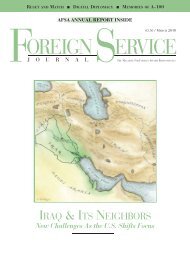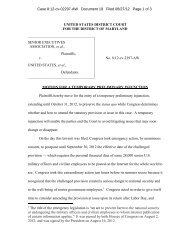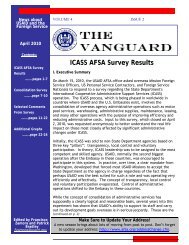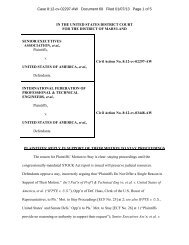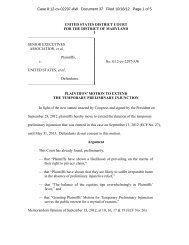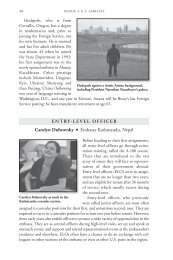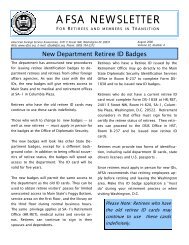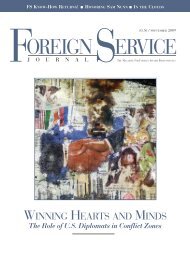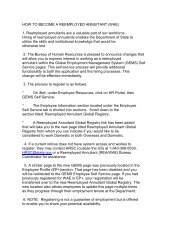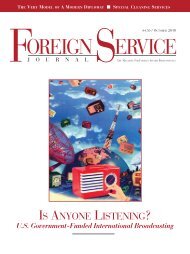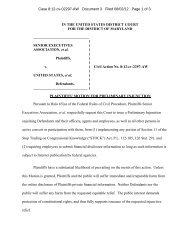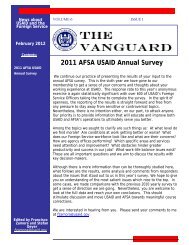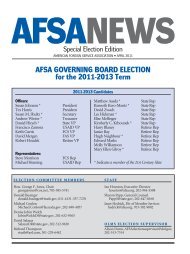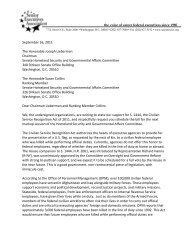F OCUS - American Foreign Service Association
F OCUS - American Foreign Service Association
F OCUS - American Foreign Service Association
Create successful ePaper yourself
Turn your PDF publications into a flip-book with our unique Google optimized e-Paper software.
F <strong>OCUS</strong> ON A FGHANISTAN<br />
THE PAKISTAN PIECE<br />
OF THE PUZZLE<br />
Almost seven years after<br />
9/11 and the U.S. invasion of Afghanistan, the role of<br />
Pakistan in the imbroglio remains murky. Relations<br />
between Afghanistan and Pakistan have been largely<br />
antagonistic since Pakistan gained independence in 1947<br />
— with the exception of the five years of Taliban rule<br />
between 1996 and 2001.<br />
In 2001, the U.S. demanded that Pakistan renounce<br />
the Taliban, whose rise to power was facilitated by<br />
Islamabad, and refrain from installing Afghan leaders of<br />
its own in Kabul. Convinced, however, that the <strong>American</strong><br />
presence in the region would not last, Pakistan embarked<br />
on a dual-track policy — providing sanctuary to the remnants<br />
of the Taliban on one side of the border, while officially<br />
supporting the transitional Afghan government on<br />
the other.<br />
Until 2005, Islamabad refrained from any serious<br />
interference, helping in the organization of the October<br />
AFGHANISTAN’S CONTENTIOUS RELATIONSHIP<br />
WITH ITS NEXT-DOOR NEIGHBOR IS A CRITICAL<br />
ELEMENT IN ITS CONTINUING TROUBLES.<br />
BY FREDERIC GRARE<br />
Frederic Grare is a visiting scholar at the Carnegie Endowment<br />
for International Peace, where he leads a project<br />
assessing U.S. and European policies toward Pakistan. A<br />
leading expert and writer on South Asia, security issues,<br />
Islamist movements and sectarian conflict in Pakistan and<br />
Afghanistan, he edited the volume, India, China, Russia:<br />
Intricacies of an Asian Triangle (India Research Press, 2005).<br />
2004 presidential elections in the Afghan refugee camps,<br />
as well as the September 2005 parliamentary vote.<br />
Relations began deteriorating again in late 2005 with<br />
the resurgence of the Taliban in the Afghan provinces<br />
bordering Pakistan. In March 2006, the two countries’<br />
presidents, Hamid Karzai and Pervez Musharraf, traded<br />
accusations of interference in each country’s affairs. The<br />
antagonism reached a new peak in May 2007, when<br />
Afghan demolition of a fence erected by Pakistan on the<br />
border as a result of <strong>American</strong> pressure prompted a<br />
series of clashes in which more than 50 Afghan civilians<br />
and officers were killed. During the past year, relations<br />
have improved somewhat but remain tense.<br />
Normalization of the Pakistan-Afghanistan relationship<br />
is an essential element in bringing about a stable and<br />
developing Afghanistan. To understand how that might<br />
be possible, it is necessary to look closely at Islamabad’s<br />
policy toward Afghanistan and what shapes it.<br />
Threat Perceptions<br />
The row over the countries’ border is a paradox: Kabul<br />
constantly accuses Islamabad of violating a border that<br />
Kabul itself does not recognize. Indeed, this dispute is at<br />
the core of the complex and unstable bilateral relationship.<br />
Imposed by British colonialists in 1893 after two<br />
wars to conquer the Afghans produced a stalemate, the<br />
JULY-AUGUST 2008/FOREIGN SERVICE JOURNAL 41



